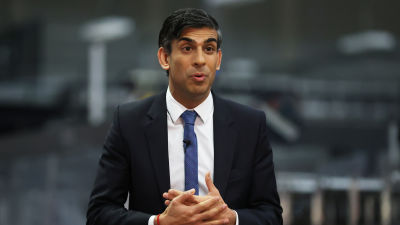Explained: Rishi Sunak's new law to deter asylum seekers

Here are the important features of the new law, to be announced tomorrow, that is supposed to deter asylum seekers from crossing the Channel.
One important clause is that only those who come directly, by air, from their home country - such as Afghanistan or Iran - will have a legitimate claim to asylum. If they come by train, boat or lorry, through the territory of safe countries, they will be criminalised on arrival.
Another important clause is that there will be only one allowable argument for an asylum seeker, who has arrived in the UK without prior permission, to seek leave to stay here - which is to claim that he or she would suffer "serious and irreversible" harm if removed from the UK.
It means, for example, that the Modern Slavery Act would no longer be "suspensive" - in the legal terminology - of the provisions of the law that would criminalise asylum seekers.
This single potential route for seeking asylum, the argument that being expelled would lead to the refugee being tortured or murdered, is why the new law is supposedly consistent with the UK's continued membership of the European Convention on Human Rights.
Even so, it represents a dramatic reduction in the rights of those wanting asylum in the UK, and thousands of them will be detained on arrival in the equivalent of a prison for at least 28 days before being eligible for bail - which is the same minimum period of imprisonment that applies to terrorists.
Tomorrow's new requirement to imprison asylum seekers is why the Home Office is frantically trying to bring into service new facilities to serve as these de-facto prisons. I am told that in the coming days, two former military bases will be unveiled as detention centres for asylum seekers.
The prime minister's hope is that most of these detained asylum seekers will - in time - be expelled to safe countries. And once expelled, they will have no right to return for the rest of their lives, even to visit relatives or for a holiday.
But for thousands of these asylum seekers, expulsion won't happen for months, in part because the government's hope that many could be removed to Rwanda is being challenged in the courts, with no prospect of definitive judgement for at least six months.
So this policy is unlikely to be effective unless and until the UK reaches an agreement with other safe countries, such as France, for there to be a presumption that asylum seekers would be sent there when those asylum seekers have been in those safe countries en route to the UK.
Such an agreement with France will be discussed by Rishi Sunak with France's President Macron at a summit on Friday - although UK officials say there is no prospect of an agreement on this any time soon.
Instead, Sunak hopes the summit will see France agreeing to increase policing of beaches to deter and prevent small-boat crossings.
An important difference with last year's Nationality and Borders Act is that the earlier law criminalised asylum seekers for simply the first six months of their stay in the UK.
If they managed to stay here for half a year, and most have, at that point they were able to apply for asylum.
Here is the proof of how ineffective the Nationality and Borders Act has been. Since it became law on 28 April 2022, 18,000 asylum claims have been deemed as inadmissible but only 21 have been expelled.
One concern about the toughening of the government's approach to asylum seekers is that it will provide an incentive to criminal gangs to move as many refugees as possible to the UK in the coming months, before the policies are on the statute book - which is unlikely to happen till at least the summer.
To attempt to pre-empt this, there will be a clause in the new law that will backdate the criminalisation to tomorrow's date.
One final and important new clause is that the home secretary Suella Braverman and the prime minister will announce a commitment to consult with local authorities every year and pre-announce that the UK will take a set number of asylum seekers through "safe and legal" routes every year.
This refugee quota will be put to an annual vote of MPs, and - according to sources - is likely to be around 20,000 per annum.
Where the UK is taking asylum seekers from countries where there is no British consulate, the government will work with the United Nations High Commissioner for Refugees to identify suitable candidates for asylum.
It is not clear how this would work in a country like Afghanistan where the UNHCR has no ability to register anyone as an asylum seeker.
One final point.
Sunak has promised to solve the small boats crisis as one of his five big pledges to the nation. But it is by no means guaranteed that what he announces tomorrow will of itself reduce the numbers of those risking their lives to come here.
It was one of the biggest news stories of our time - and it's still not over. So what did Boris Johnson know about Downing Street’s notorious parties? With fresh revelations from our Number 10 sources, in their own words, listen to the inside story...